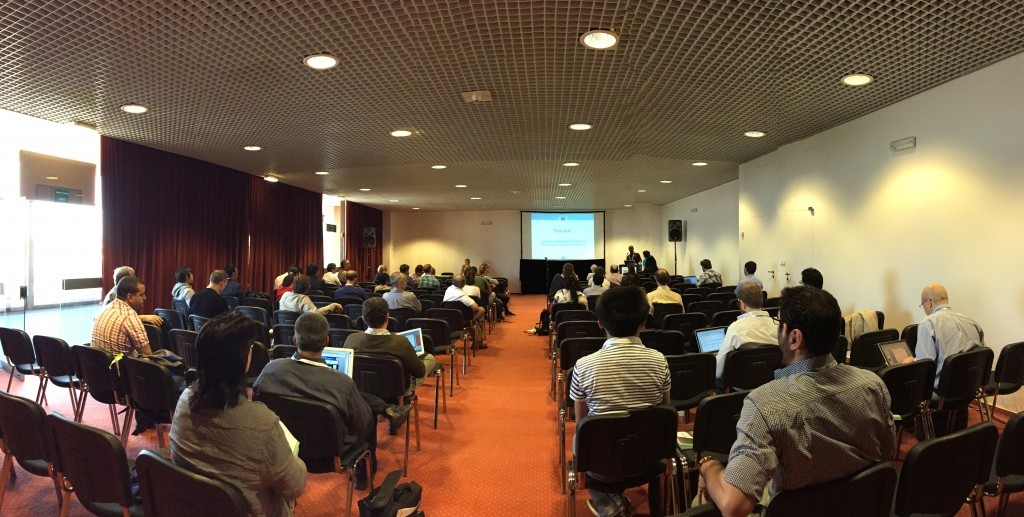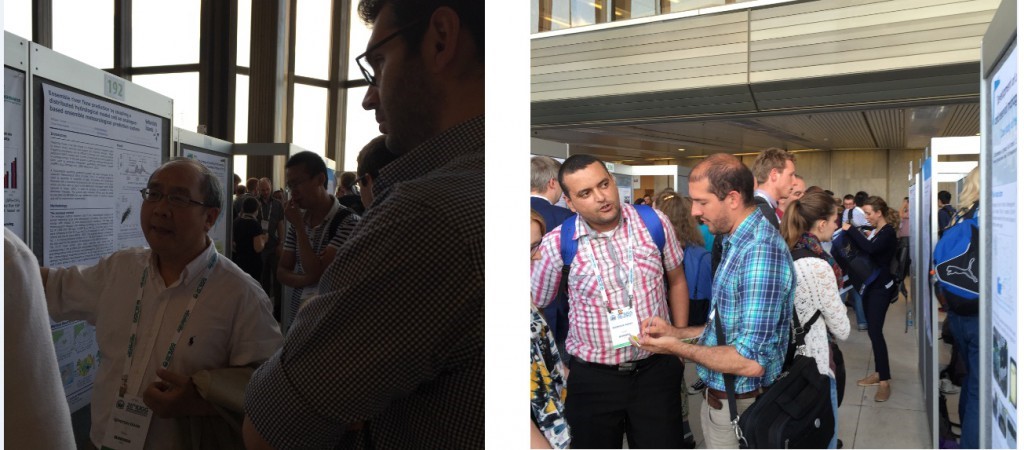IAHS News
HEPEX News
Research to operations (and vice versa) in hydrological forecasting
Contributed by Maria-Helena Ramos, Fredrik Wetterhall, Andy Wood, Julie Demargne, Qingyun Duan, Liz Stephens and Massimiliano Zappa.
Sunday is usually a day of rest, but June 28th was not very restful for a group of scientists and practitioners interested in hydrological forecasting and predictive uncertainty. The IAHS Workshop ‘Hydrological Forecasting and Predictive Uncertainty: Advances and Challenges of Transferring Science into Operational Practice’ [1] was held for the first time at the 26th IUGG General Assembly/IAHS symposia and workshops in Prague.
The workshop was organized and attended by enthusiastic HEPEX members from around the world. HEPEX (the Hydrologic Ensemble Prediction Experiment) is a community initiative that has been running for over 10 years. HEPEX seeks to advance the science and practice of hydrologic ensemble prediction and its usage for risk-based decision making. It is currently led by three co-chairs who work with regional co-chairs and an invaluable cadre of volunteers to organize international workshops, sessions or meetings at major conferences, plan and coordinate experiments, highlight operational or experimental real-time examples of ensemble prediction for various applications, and advance the community understanding of key issues in hydrologic prediction. A backbone of HEPEX since 2012 has been a strong community online interaction via the HEPEX Blog website, www.hepex.org.
In Prague, HEPEX engaged in a full day of oral and poster presentations covering a wide range of topics of interest to hydrological prediction science. The session was live-tweeted throughout the day to #hepex, creating an intense social media activity that could be followed from all over the world in real-time at http://hepex.irstea.fr/live-from-iuggiahs-workshop-prague
A number of science and operational issues were discussed during the session, including: the efficient ways of incorporating data assimilation and statistical pre- and post-processing techniques (for meteorological and river flow forecasts, respectively) in operational forecasting systems; the design and initial results of global flood forecasting systems to support the activities of national agencies and humanitarian organizations; and the emerging or growing topics in HEPEX of sub-seasonal to seasonal forecasting. Current needs for multi-hazard and multi-risk assessment, improving data collection and accessibility, developing collaborative approaches with local communities and users for more efficient fit-for-purpose forecasting systems were also emphasized, which certainly calls for more interdisciplinary and collaborative research programs in hydrology [2].
An overarching goal of this session was to contribute to (or launch) community-wide discussions on the research to operation (or applications) loop in hydrological forecasting: how best to advance operational hydrology with research achievements in ensemble prediction – and vice versa, how to effectively bring the practical experience of operational centers into research programs for enhanced approaches? HEPEX highlights as a main research challenge to demonstrate the added value of hydrological ensemble predictions for emergency management and water resources sectors to make decisions that have important consequences for economy, public health and safety. It is likely not enough to establish a skillful forecasting system – i.e., to calibrate a hydrological model over a targeted river basin and run it with the most advanced meteorological forecasts and real-time hydrological data assimilation techniques, etc. To ensure that model outputs are valuable inputs for decision-making, such new methods and approaches developed by researchers need to be assessed in close collaboration with forecast users.
Making real-time, often automated forecasting systems accessible and transparent for both scientists and practitioners can facilitate investigation into how methods developed in a research context work in practice. Modellers and forecasters can thus evaluate a wide range of opportunities for forecast improvement: alternative hydrologic model(s), new forcing data and methods to drive hydrologic modeling, objective calibration methods to support hydrologic model implementation, automated data assimilation to specify initial watershed conditions for hydrologic forecasts, new weather and climate forecast data, new methods to post-process streamflow forecasts and reduce systematic errors, ensemble prediction techniques and verification approaches.
A new wealth of data, computing and scientific resources for hydrologic forecasting is available today, making this an exciting time for the discipline. But it is also a transitional time, in that long-standing traditions and concepts in operational hydrologic forecasting may need to be reconciled with new opportunities to fully leverage the new science and resources. Improving interplay and interaction between operational forecasters, scientists and decision makers is a challenge, but also the foundation of any promising strategy to address larger and more complex problems in hydrologic prediction.
More about HEPEX:
- Join the community and subscribe to the mailing list to receive updates on blog posts, activities, and meetings: http://hepex.irstea.fr/join-hepex-2/
- Watch our HEPEX webinars: https://www.youtube.com/user/HEPEXWebinars/feed
- Come to our next HEPEX activity: Workshop on Seasonal Hydrological Forecasting (http://hepex.irstea.fr/hepex-workshop-on-seasonal-hydrological-forecasting/), 21-23rd September 2015, Norrköping, Sweden.
--------------------------
[1] HW17 Hydrological Forecasting and Predictive Uncertainty: Advances and Challenges of Transferring Science into Operational Practice, Convener: Maria-Helena Ramos (France), Co-conveners: Walter Collischonn (Brazil), Fredrik Wetterhall (UK), Andy Wood (USA), Jan Verkade (The Netherlands), Jutta Thielen (Italy), Massimiliano Zappa (Switzerland), Marco Borga (Italy), François Anctil (Canada), Qingyun Duan (China), Q.J. Wang (Australia)
[2] An extended feedback on the session can be found on the Hepex blog post: http://hepex.irstea.fr/from-research-to-operations-and-vice-versa-feedback-from-the-hepex-session-at-iuggiahs-workshop/
Photos:

Hydrological forecasting oral and poster sessions at IUGG/IAHS Workshop in Prague, 28 June 2015 (photos by M.-H. Ramos)
